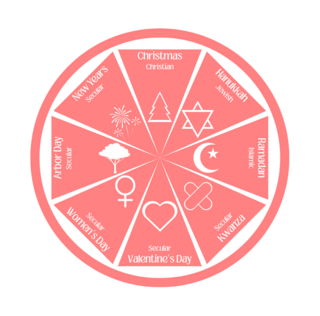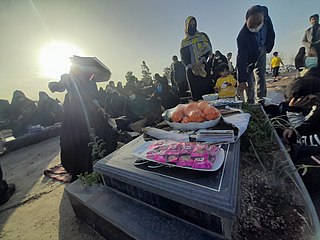Related Research Articles

A holiday is a day or other period of time set aside for festivals or recreation. Public holidays are set by public authorities and vary by state or region. Religious holidays are set by religious organisations for their members and are often also observed as public holidays in religious majority countries. Some religious holidays, such as Christmas, have become secularised by part or all of those who observe them. In addition to secularisation, many holidays have become commercialised due to the growth of industry.
July is the seventh month of the year in the Julian and Gregorian calendars. Its length is 31 days. It was named by the Roman Senate in honour of Roman general Julius Caesar in 44 B.C., being the month of his birth. Before then it was called Quintilis, being the fifth month of the calendar that started with March.

The New Year is the time or day at which a new calendar year begins and the calendar's year count increments by one. Many cultures celebrate the event in some manner. In the Gregorian calendar, the most widely used calendar system today, New Year occurs on January 1. This was also the first day of the year in the original Julian calendar and the Roman calendar.

Mother's Day is a celebration honoring the mother of the family or individual, as well as motherhood, maternal bonds, and the influence of mothers in society. It is celebrated on different days in many parts of the world, most commonly in the months of March or May. It complements similar celebrations, honoring family members, such as Father's Day, Siblings Day, and Grandparents' Day.

In the Gregorian calendar, New Year's Day is the first day of the calendar year, 1 January. Most solar calendars begin the year regularly at or near the northern winter solstice, while cultures and religions that observe a lunisolar or lunar calendar celebrate their Lunar New Year at less fixed points relative to the solar year.

Diwali is the Hindu festival of lights, with variations celebrated in other Indian religions. It symbolises the spiritual "victory of light over darkness, good over evil, and knowledge over ignorance". Diwali is celebrated during the Hindu lunisolar months of Ashvin and Kartika—between around mid-September and mid-November. The celebrations generally last five or six days.

Nowruz is the Iranian or Persian New Year celebrated by various ethnic groups worldwide. It is a festival based on the spring equinox—which marks the first day of the new year in the Iranian Solar Hijri calendar, on or around 21 March on the Gregorian calendar.

Eid al-Adha or the Feast of Sacrifice is the second of the two main holidays celebrated in Islam. In Islamic tradition, it honours the willingness of Abraham to sacrifice his son as an act of obedience to God's command. Depending on the narrative, either Ishmael or Isaac is referred to with the honorific title "Sacrifice of God". However, before Abraham could sacrifice his son in the name of God, and because of his willingness to do so, God provided him with a lamb to sacrifice in his son's place. In commemoration of this intervention, animals such as lambs are sacrificed. The meat of the sacrificed animal is divided into three portions: one part of the meat is consumed by the family that offers the animal, one portion is for friends and relatives, while the rest of the meat is distributed to the poor and the needy. Sweets and gifts are given, and extended family members typically visit and are welcomed. The day is also sometimes called the "Greater Eid".

In the United States, public holidays are set by federal, state, and local governments and are often observed by closing government offices or giving government employees paid time off. The federal government does not require any private business to close or offer paid time off, as is the case for most state local governments, so employers determine which holidays to observe.
Bangladesh has numerous public holidays, including national memorial, religious and secular holidays of Bengali origin. The Bengali traditional calendar, known as Baṅgābda is the national and official calendar in Bangladesh. The holidays are celebrated according to Bengali, Islamic or Gregorian calendars for religious and civil purposes, respectively. Religious festivals like Eid are celebrated according to the Islamic calendar whereas other national holidays are celebrated according to the Bengali and Gregorian calendar. While the Islamic calendar is based on the movement of the moon, it loses synchronization with the seasons, through seasonal drift. Therefore, some public holidays are subject to change every year based on the lunar calendar.

Pohela Boishakh ) is the Bengali New Year celebrated on 14 April in Bangladesh and 15 April in the Indian states of West Bengal, Tripura, Jharkhand and Assam. It is a festival based on the spring harvest—which marks the first day of the new year in the official calendar of Bangladesh.
The schedule of 11 public holidays in Singapore which are gazetted and recognized since the establishment of Singapore's 1998 Holidays Act.

Vaisakhi, also known as Baisakhi, marks the first day of the month of Vaisakh and is traditionally celebrated annually on 13 April and sometimes 14 April. It is seen as a spring harvest celebration primarily in Punjab and Northern India. Whilst it is culturally significant as a festival of harvest, in many parts of India, Vaisakhi is also the date for the Indian Solar New Year.
Vikram Samvat, also known as the Vikrami calendar is a Hindu calendar historically used in the Indian subcontinent and still used in several states. It is a solar calendar, using twelve to thirteen lunar months each solar sidereal years. The year count of the Vikram Samvat calendar is usually 57 years ahead of the Gregorian calendar, except during January to April, when it is ahead by 56 years.

Buddha's Birthday or Buddha Day is a primarily Buddhist festival that is celebrated in most of South, Southeast and East Asia, commemorating the birth of the prince Siddhartha Gautama, who became the Gautama Buddha and founded Buddhism. According to Buddhist tradition and archaeologists, Gautama Buddha, c. 563-483 BCE, was born at Lumbini in Nepal. Buddha's mother was Queen Maya Devi, who delivered the Buddha while undertaking a journey to her native home, and his father was King Śuddhodana. The Mayadevi Temple, its gardens, and an Ashoka Pillar dating from 249 BCE mark the Buddha's birth place at Lumbini.
Public holidays are celebrated by the entire population of Egypt. Holidays in Egypt have many classifications. Some holidays are religious and others are secular, while some can be fixed holidays on the calendar while others are movable. There are four Islamic holidays and two Christian holidays. The National Day of Egypt is celebrated on July, 23 which coincides with the annual celebration of the Egyptian revolution of 1952 when the modern republic of Egypt was declared, ending the period of the Kingdom of Egypt.

Bayram is the Turkic word for a nationally-celebrated festival or holiday, applicable to both national and religious celebrations.

Shab-e-Barat, Cheragh-e-Barat, Berat Kandili, or Nisfu Syaaban is a Mid-Sha'ban related cultural celebration celebrated in many South Asian, Central Asian, South East Asian and Middle Eastern Muslim countries, on the 15th night of the month of Sha'ban, the eighth month of the Islamic calendar.
Punjabi festivals are various festive celebrations observed by Punjabis in Pakistan, India and the diaspora Punjabi community found worldwide. The Punjabis are a diverse group of people from different religious background that affects the festivals they observe. According to a 2007 estimate, the total population of Punjabi Muslims is about 90 million, with 97% of Punjabis who live in Pakistan following Islam, in contrast to the remaining 30 million Punjabi Sikhs and Punjabi Hindus who predominantly live in India.
References
- ↑ "Photos: Countries worldwide mark International Labour Day". www.aljazeera.com. Retrieved 30 September 2022.
External Links